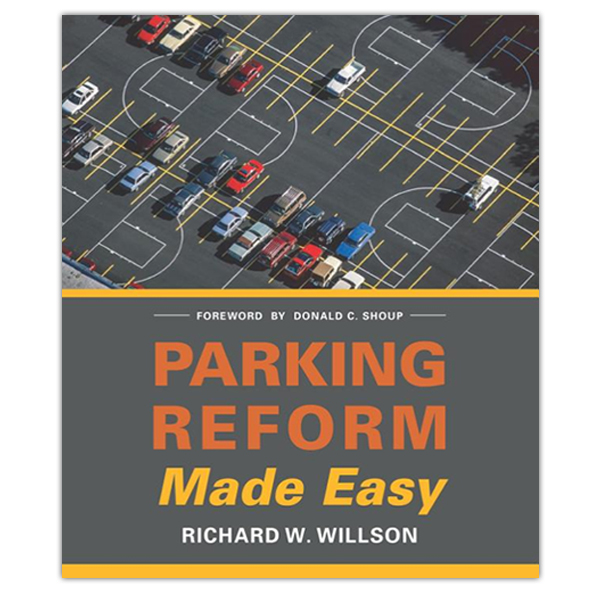Description
Author Richard W. Willson argues that many of today’s parking problems stem from outdated minimum parking requirements. In this practical guide, he shows readers how to reform parking requirements in a way that supports planning goals and creates vibrant cities.
But making effective change requires more than relying on national averages or information from neighboring communities. Instead, Willson shows how readers can confidently develop their own requirements based on local parking data, an understanding of future trends affecting parking use, and clear policy choices.
Case studies are used to illustrate what works, what doesn’t, and how to overcome challenges. Willson also explores the process of codifying regulations and how to work with stakeholders to avoid political conflicts.
With Parking Reform Made Easy, readers will learn, step-by-step, how to update parking requirements. The result will be higher density, healthier, more energy-efficient, and livable communities.
Table of Contents
- Introduction: Reframing Parking Requirements as a Policy Choice
- Parking Requirements as Policy
- How Did We Get Here?
- Origins and Current Practice
- How Do Parking Requirements Work?
- Reform or Eliminate Parking Requirements?
- Map of the Book
- Justifications for and Case against Parking Requirements
- Justifications for Minimum Parking Requirements
- Case against Minimum Parking Requirements
- Interaction among Impacts: Cobenefits and Reinforcing Harms
- Justifications for and Case against Parking Maximums
- Smart and Not So Smart: Current Practice
- Relationship to Plans
- Varying Policy Approaches
- Comparison of Parking Requirements
- Past Performance Is No Guarantee of Future Results
- Current Practice
- A Review of Long-term Influences
- The Parking Requirement Repair Toolkit
- Getting Started
- Toolkit Elements
- Parking Requirements for Multifamily Housing
- Multifamily Parking Requirements
- Factors That Influence Multifamily Parking Requirements
- Case Study Analysis
- Parking Requirements for Income-restricted Affordable Housing
- Parking Management for Multifamily Housing
- Parking Requirements for Workplaces
- Office Parking Requirements
- Factors That Influence Office Parking Requirements
- Case Study Analysis
- Parking Management for Office Districts
- Parking Requirements for Mixed-use, Transit-oriented Developments
- Shared Parking and Transit-oriented Parking Concepts
- Mixed-use, Transit-oriented Parking Requirements
- Factors That Influence Mixed-use, Transit-oriented Parking Utilization
- Case Study: Mixed-use Complex
- Case Study: Mixed-use District
- Parking Management for Mixed-use, Transit-oriented Districts
- Codifying Parking Requirement Reform
- Scope of Effort
- Zoning Typology
- Principles of Effective Zoning
- Implications of Zoning Reforms for Parking Requirements
- Inventory of Parking Requirement Reform Measures
- Parking Regulation in Form-based Codes
- Parking Requirements for Infill and Redevelopment
- Community Engagement and Politics
- Working with Stakeholders
- Parking Reform Processes
- Paved Paradise Revisited
- A Call for Action
- Framing the Options
- The Toolkit
- In Praise of Incrementalism
About the Author
Richard W. Willson, Ph.D., FAICP, is Professor and Chair in the Department of Urban and Regional Planning at California State Polytechnic University, Pomona.



